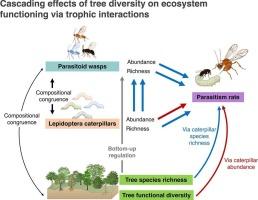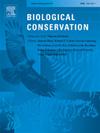树木多样性丧失对草食-寄生性相互作用的级联效应
IF 4.4
1区 环境科学与生态学
Q1 BIODIVERSITY CONSERVATION
引用次数: 0
摘要
全球生物多样性丧失已被证明对生态系统功能产生负面影响,其对营养水平相互作用的影响起着至关重要的中介作用。植食昆虫及其拟寄生物的群落和相互作用往往对环境变化敏感,并能迅速响应植物多样性丧失等变化。然而,我们对这些变化和形成社区动态的关键驱动因素的理解仍然有限。基于世界上最大的树木多样性实验,我们研究了树木多样性丧失对草食-寄生性相互作用的影响。结果表明,增加树种丰富度可促进植食性和寄生性多样性,而寄生率受树种丰富度的显著正相关,与树木功能多样性呈负相关。寄生蜂群落组成主要直接响应草食动物群落的变化,而草食动物群落的变化又与乔木群落组成和性状密切相关。我们的研究结果强调了植物多样性在维持多营养生物多样性和物种相互作用中的关键作用。因此,我们的研究通过证明多样性对生态系统功能的影响通过相互关联的物种相互作用在营养水平上级联,为森林生物多样性保护提供了新的见解。本文章由计算机程序翻译,如有差异,请以英文原文为准。

Cascading effects of tree diversity loss on herbivore-parasitoid interactions
Global biodiversity loss has been shown to negatively impact ecosystem functioning, with repercussions on interactions across trophic levels playing a crucial intermediary role. Communities and the interactions of insect herbivores and their parasitoids are often sensitive to environmental changes and can rapidly respond to shifts such as plant diversity loss. However, our understanding of these changes and the key drivers shaping community dynamics remains limited. Based on the world's largest tree diversity experiment, we investigated the effects of tree diversity loss on herbivore–parasitoid interactions. We found that both herbivore and parasitoid diversity were promoted by increasing tree species richness, while parasitism rates were significantly positively affected by tree species richness but negatively associated with tree functional diversity. Parasitoid community composition primarily responded directly to changes in herbivore communities, which were in turn strongly linked to tree community composition and traits. Our results highlight the crucial role of plant diversity in sustaining multitrophic biodiversity and species interactions. Our study thus provides novel insights into forest biodiversity conservation by demonstrating that diversity effects on ecosystem functioning cascade across trophic levels through interconnected species interactions.
求助全文
通过发布文献求助,成功后即可免费获取论文全文。
去求助
来源期刊

Biological Conservation
环境科学-环境科学
CiteScore
10.20
自引率
3.40%
发文量
295
审稿时长
61 days
期刊介绍:
Biological Conservation is an international leading journal in the discipline of conservation biology. The journal publishes articles spanning a diverse range of fields that contribute to the biological, sociological, and economic dimensions of conservation and natural resource management. The primary aim of Biological Conservation is the publication of high-quality papers that advance the science and practice of conservation, or which demonstrate the application of conservation principles for natural resource management and policy. Therefore it will be of interest to a broad international readership.
 求助内容:
求助内容: 应助结果提醒方式:
应助结果提醒方式:


